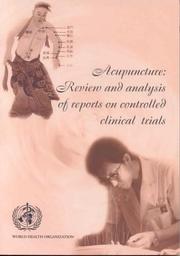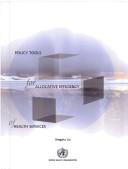| Listing 1 - 5 of 5 |
Sort by
|
Book
ISBN: 9782870378571 2870378572 Year: 2015 Volume: *2 Publisher: Namur Presses universitaires de Namur
Abstract | Keywords | Export | Availability | Bookmark
 Loading...
Loading...Choose an application
- Reference Manager
- EndNote
- RefWorks (Direct export to RefWorks)
Bewijsgebaseerde geneeskunde --- Biologie -- Méthodes statistiques --- Biologie -- Statistische methoden --- Biologie quantitative --- Biology -- Statistical methods --- Biometrics (Biology) --- Biometrie --- Biometry --- Biométrie --- Biostatistics --- Biostatistique --- Diagnose --- Diagnosis --- Diagnostic --- EBM (Medicine) --- Evidence-based healthcare --- Evidence-based medicine --- Evidenzbasierte Medizin --- Examinations [Medical ] --- Geneeskunde op basis van bewijs --- Medical diagnosis --- Medical examinations (Diagnosis) --- Medicina basada en la evidencia --- Medicina basata su prove di efficacia --- Médecine basée sur des preuves --- Médecine basée sur la preuve --- Médecine basée sur le niveau de preuve --- Médecine basée sur les preuves --- Médecine factuelle --- Médecine fondée sur des preuves --- Médecine fondée sur les données probantes --- Médecine fondée sur les faits --- Statistique biologique
Book
ISBN: 9789401428965 Year: 2016 Volume: *7 Publisher: Leuven LannooCampus
Abstract | Keywords | Export | Availability | Bookmark
 Loading...
Loading...Choose an application
- Reference Manager
- EndNote
- RefWorks (Direct export to RefWorks)
Alternatieve therapieën, dokter Google, ... hoe ga je ermee om als arts? De Wat met-reeks wil het maatschappelijke debat over belangrijke thema's die de mens raken op een kritische manier wetenschappelijk onderbouwen. De publicaties scheiden feiten van fictie, reiken de nodige voorgeschiedenis aan, wijzen ons op de dilemma's en bieden een duidelijk toekomstperspectief. Binnen de geneeskunde wordt steeds meer de nadruk gelegd op evidence-based medicine (EBM), het gebruik van wetenschappelijk onderbouwde behandelingsmethoden. Tegelijkertijd willen mensen meer en meer weten hoe ze gezond moeten blijven en zoeken ze zelf informatie in de pers of op het internet. Het is echter niet altijd gemakkelijk om in te schatten hoe betrouwbaar die informatie is. Bovendien spelen ook de unieke levensomstandigheden van patiënten een rol. Dit boek bekijkt welke gezondheidsinformatie er waar aanwezig is, hoe we weten welke informatie we kunnen vertrouwen, en hoe we de doorstroming van informatie kunnen verbeteren. Daarbij staan enkele vragen centraal: - Hoe maak je wetenschappelijke inzichten relevant voor een patiënt? - Hoe weten we welke gezondheidsinformatie correct is? - Welke expertise heeft de patiënt zelf? - Hoe stemmen we persoonlijke ervaring en wetenschap op elkaar af? Wat met de mondige patiënt? biedt een leidraad voor duidelijke communicatie, met aandacht voor de persoonlijke situatie en inbreng van de patiënt.
Bewijsgebaseerde geneeskunde --- Communicatie in de geneeskunde --- Communication en médecine --- Communication in medicine --- EBM (Medicine) --- Evidence-based healthcare --- Evidence-based medicine --- Evidenzbasierte Medizin --- Geneeskunde op basis van bewijs --- Medicina basada en la evidencia --- Medicina basata su prove di efficacia --- Médecine basée sur des preuves --- Médecine basée sur la preuve --- Médecine basée sur le niveau de preuve --- Médecine basée sur les preuves --- Médecine factuelle --- Médecine fondée sur des preuves --- Médecine fondée sur les données probantes --- Médecine fondée sur les faits --- Patient satisfaction --- Patients -- Satisfaction --- Patiënten -- Voldoening --- Gezondheidsvoorlichting --- Patiëntenvoorlichting --- Medische informatie --- Mondige patiënt

ISBN: 9241545437 0585467498 9786610011612 1280011610 9240680020 Year: 2002 Publisher: Geneva : World Health Organization,
Abstract | Keywords | Export | Availability | Bookmark
 Loading...
Loading...Choose an application
- Reference Manager
- EndNote
- RefWorks (Direct export to RefWorks)
The therapy of acupuncture has a long history. In its 2500 years of development, a wealth of experience has been accumulated, attesting to the wide range of diseases and conditions that can effectively be treated with its approach. In the past two decades, there have been extensive studies on acupuncture and great efforts have been undertaken to conduct controlled clinical trials, including the use of ''sham'' acupuncture or ''placebo'' acupuncture controls. This document is a brief review of the current literature on acupuncture practice, which may provide information about the effectiveness
Bewijsgebaseerde geneeskunde --- Clinical trials --- Controlled clinical trials --- EBM (Medicine) --- Evidence-based healthcare --- Evidence-based medicine --- Evidenzbasierte Medizin --- Geneeskunde op basis van bewijs --- Jugements cliniques --- Klinische oordelen --- Medicina basada en la evidencia --- Medicina basata su prove di efficacia --- Médecine basée sur des preuves --- Médecine basée sur la preuve --- Médecine basée sur le niveau de preuve --- Médecine basée sur les preuves --- Médecine factuelle --- Médecine fondée sur des preuves --- Médecine fondée sur les données probantes --- Médecine fondée sur les faits --- Oordelen [Klinische ] --- Patient trials of new treatments --- Randomized clinical trials --- Trials [Clinical ] --- Acupuncture. --- Physiotherapy. Alternative treatments --- klinisch onderzoek (farmacologie) --- acupunctuur --- wetenschappelijk onderzoek --- Acupressure. --- Finger pressure therapy --- Jin shin do --- Jin shin jyutsu --- Shiatsu --- Shiatzu --- Massage --- Counterirritation --- Energy medicine --- Acupuncture --- Therapeutics

ISBN: 9241562528 0585492530 9786610060597 9240681124 128006059X Year: 2003 Publisher: Geneva : World Health Organization,
Abstract | Keywords | Export | Availability | Bookmark
 Loading...
Loading...Choose an application
- Reference Manager
- EndNote
- RefWorks (Direct export to RefWorks)
Health care should be provided efficiently, given the potential gains for patients and the population and the high cost of some kinds of care. Emphasizing the most cost-effective services can in principle attain the greatest health gains. Policies are implemented through tools available to policy makers, particularly those in government who can influence not only public expenditure and service delivery but also how private insurers and providers allocate resources among diseases and individuals. Example's of tools that nudge a health system toward greater value for money, while respecting fairness and the wishes of taxpayers, patients and health workers, include specifying coverage by insurance or public provision, promoting or limiting medical procedures, and methods of contracting for service delivery and paying providers. Policy Tools reviews an enormous research literature for evidence that particular policies can improve how efficiently health services are delivered, aiming not only at what policies to recommend but at what it takes to make them effective.
Bewijsgebaseerde geneeskunde --- EBM (Medicine) --- Economics [Medical ] --- Economie médicale --- Etat et médicine --- Evidence-based healthcare --- Evidence-based medicine --- Evidenzbasierte Medizin --- Geneeskunde en staat --- Geneeskunde op basis van bewijs --- Geneeskunde--Economische aspecten --- Geneeskunde--Overheidsbeleid --- Geneeskunde--Regeringspolitiek --- Gezondheid--Economische aspecten --- Gezondheidsbeleid --- Gezondheidseconomie --- Gezondheidszorg--Economische aspecten --- Gezondheidszorg--Overheidsbeleid --- Gezondheidszorg--Regeringspolitiek --- Health economics --- Health policy --- Health--Economic aspects --- Hygiene--Economic aspects --- Hygiène--Aspects économiques --- Hygiëne--Economische aspecten --- Medical care--Economic aspects --- Medical care--Government policy --- Medical economics --- Medical policy --- Medicina basada en la evidencia --- Medicina basata su prove di efficacia --- Medicine and state --- Medicine--Economic aspects --- Médecine basée sur des preuves --- Médecine basée sur la preuve --- Médecine basée sur le niveau de preuve --- Médecine basée sur les preuves --- Médecine factuelle --- Médecine fondée sur des preuves --- Médecine fondée sur les données probantes --- Médecine fondée sur les faits --- Médecine--Aspects économiques --- Médecine--Politique gouvernementale --- Médicine et état --- Policy [Medical ] --- Politique de santé --- Politique médicale --- Politique sanitaire --- Protection sanitaire --- Public health--Government policy --- Santé [Politique de ] --- Santé publique--Politique gouvernementale --- Santé--Aspects économiques --- Soins médicaux--Aspects économiques --- Soins médicaux--Politique gouvernementale --- Staat en geneeskunde --- State and medicine --- Medical policy. --- Medical economics. --- Evidence-based medicine. --- Economics, Medical --- Health --- Hygiene --- Medical care --- Medicine --- Health care policy --- Policy, Medical --- Public health --- Public health policy --- Economic aspects --- Government policy --- Science and state --- Social policy --- Clinical medicine --- Systematic reviews (Medical research) --- Decision making --- Health planning --- Methods --- Health care rationing
Book
ISBN: 9789289072953 9289072954 9789289072960 Year: 2007 Publisher: Brussels European Observatory on Health Systems and Policies
Abstract | Keywords | Export | Availability | Bookmark
 Loading...
Loading...Choose an application
- Reference Manager
- EndNote
- RefWorks (Direct export to RefWorks)
Health impact assessment (HIA) is a support tool for intersectoral decision- and policy-making. It is used to assess the potential health consequences of pending decisions and it feeds this information back into the decision-making process. This book provides a detailed map of the use of HIA in the WHO European Region across a large range of sectors, including transport, environment, urban planning and agriculture, and at national, regional and local levels. It also reviews the implementation and institutionalization of HIA with specific focus on governance, financing, resource generation and delivery. HIA's effectiveness is explored and analysed in 17 case studies using a common analytical approach. This research also identifies the factors that contribute to the effectiveness of HIA. Overall the book demonstrates that HIA can be effective, while also revealing the uneven development and incomplete institutionalization of HIA across Europe. The book is based on a European research project funded under the European Union Public Health Work Programme. The research was led by the European Observatory on Health Systems and Policies and included research teams from 19 countries.
Analyse du risque --- Analysis [Risk ] --- Assessment [Risk ] --- Bewijsgebaseerde geneeskunde --- EBM (Medicine) --- Estimation des risques --- Estimation du risque --- Evidence-based healthcare --- Evidence-based medicine --- Evidenzbasierte Medizin --- Geneeskunde op basis van bewijs --- Gezondheid--Indicatoren --- Gezondheidsindicatoren --- Health administration --- Health care administration --- Health indicators --- Health sciences administration --- Health status indexes --- Health status indicators --- Indexes [Health status ] --- Indicateurs sanitaires --- Indicators [Health status ] --- Medicina basada en la evidencia --- Medicina basata su prove di efficacia --- Médecine basée sur des preuves --- Médecine basée sur la preuve --- Médecine basée sur le niveau de preuve --- Médecine basée sur les preuves --- Médecine factuelle --- Médecine fondée sur des preuves --- Médecine fondée sur les données probantes --- Médecine fondée sur les faits --- Public health administration --- Risk analysis --- Risk assessment --- Risk evaluation --- Santé publique--Administration --- Schatting van het risico --- Volksgezondheid--Administratie --- Évaluation des risques --- Évaluation du risque --- Health Status Indicators --- Risk Assessment --- Evidence-Based Medicine --- Socioeconomic Factors --- Program Evaluation --- Decision Making --- Policy Making --- Public Health Administration --- Case Reports --- Europe --- WA 525 Health Administration and Organization - General works --- Case studies --- Organizational Case Studies --- Health Policy --- Public health --- Decision making --- Santé publique --- Indicateurs de santé --- Prise de décision --- Europe. --- Research --- Economic aspects --- Recherche --- Aspect économique --- Cas, Etudes de --- Santé publique --- Indicateurs de santé --- Prise de décision --- Aspect économique --- Medical policy --- Indexes, Health status --- Indicators, Health status --- Health --- Health surveys --- Medical statistics --- Quality of life --- Social indicators --- Methodology
| Listing 1 - 5 of 5 |
Sort by
|

 Search
Search Feedback
Feedback About UniCat
About UniCat  Help
Help News
News